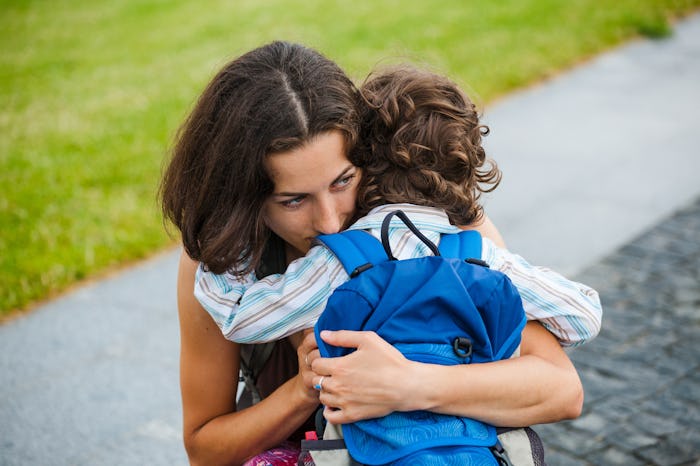Given the emotional rollercoaster and lack of sleep new moms experience with the birth of a new baby, it’s no surprise that approximately 1 in 7 moms suffer from postpartum depression or what the more low-key of us call the “baby blues.” Though it remains somewhat stigmatized — women feel as though they should find the early postpartum period as the most wonderful of their life, and guilty if they don't bond with their child — it is the most common complication of pregnancy and childbirth. Experts agree that it’s completely natural and manageable, but that doesn't mean it's addressed once and gone forever. You can relapse from postpartum depression.
There are usually a combination of environmental and biological factors that contribute to postpartum depression, Johanna Kaplan, Ph.D., clinical psychologist and director at Washington Anxiety Center of Capitol Hill in Washington, D.C., explains to Romper. “Within 2-3 days post-birth, a woman will experience a significant drop in progesterone (as the placenta caused an increase in progesterone during pregnancy and once expelled, there is a significant drop),” she says. In some women, postpartum depression (PPD) can totally throw your balance of hormones off-kilter, which, when coupled with the stress and adjustments involved with having a baby and a significant reduction in sleep, can lead to depression.
Many times, moms are very proactive during later pregnancies, making effective plans for self-care, lining up their support team, and talking openly.
Though, in most cases, symptoms of PPD begin within the first few days after giving birth, the onset could be as late as six months post-delivery. Additionally, as Jennifer Harned Adams, Ph.D., a clinical health psychologist in Denver, Colorado, points out to Romper, it’s possible to experience a sort of relapse from postpartum depression.
“Especially if a new mother encounters difficult stressors related to her return to work, weaning or relationship issues, there is a chance that she may experience a resurgence of postpartum depression in the ensuing months,” she says. This is more likely to happen, however, if a woman’s postpartum depression goes untreated.
Additionally, having postpartum depression with one baby doesn’t mean you’re guaranteed to experience it again with your second, third and so forth.
“Many times, moms are very proactive during later pregnancies, making effective plans for self-care, lining up their support team, and talking openly with their healthcare team and loved ones about the best ways to offer support, and these efforts can help prevent postpartum depression or help her catch the symptoms early before they become problematic,” explains Dr. Adams, who works at the Center for Maternal Fetal Health at Rocky Mountain Hospital for Children at Presbyterian St Luke’s Medical Center.
I lost the first five months of my son's life to this fog I lived under.
That’s been the case for Becky Vieira from San Luis Obispo, California, who, after dealing with postpartum depression a first time with her now-14-month-old son, will do everything she can to avoid falling into the trap with future pregnancies. “Almost daily I felt like I wanted to run away because I was convinced my husband and son would be better off without me," she tells Romper. "I lost the first five months of my son's life to this fog I lived under."
She is prepared to recognize the signs, this time around. “I know that it’s possible that I may feel this way again, but next time I won’t wait so long before getting on medication that can help.”
Eventually the adrenaline does wear off, so having a community to lean on will help you mentally and emotionally.
Most typically, postpartum depression is treated with psychotherapy and medication no differently than general depressive conditions unrelated to pregnancy. “Psychotherapy is helpful for learning tools and coping strategies to manage feelings, explore problem-solving options and manage unhelpful thoughts, as well as support hopefulness, increase optimism and decrease isolation and the despair that accompanies feelings of aloneness,” explains Mayra Mendez, Ph.D., LMFT, licensed psychotherapist and program coordinator for intellectual and developmental disabilities and mental health services at Providence Saint John's Child and Family Development Center in Santa Monica, California.
But treatment is two-fold. It not only involves interference with medical professionals — it also requires practical lifestyle support from friends, family and, if you have one, a parenting partner. There is also a wide range of support groups available for moms experiencing postpartum depression, which can also dramatically improve a mom’s chances of long-term recovery.
If you or someone you know is experiencing postpartum depression for the first time, or even if it’s crept back into your life, seek help. Experts warn against trying to bear the burden yourself or allowing guilt to prevent you from proper treatment. “Postpartum anxiety and depression are mental health conditions that affect many women,” says Dr. Judith M. Thorne, a psychologist at Doctor On Demand.
“You may feel fine soon after you give birth, but that may be adrenaline that is keeping you going. Eventually the adrenaline does wear off, so having a community to lean on will help you mentally and emotionally.”
Check out Romper's new video series, Romper's Doula Diaries:
Watch full episodes of Romper's Doula Diaries on Facebook Watch.
